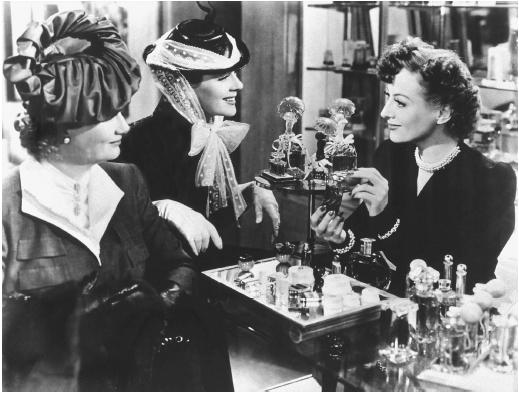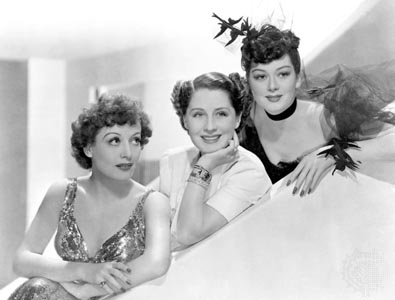 The Women is about a bunch of rich women who are all, for the most part, catty, b*tchy, and two-faced. It's because of this that it is in my top movies ever.
The Women is about a bunch of rich women who are all, for the most part, catty, b*tchy, and two-faced. It's because of this that it is in my top movies ever.The film follows Mary Haines (Norma Shearer) the wife of a rich New Yorker who discovered that her husband is having an affair with perfume counter girl Crystal Allen (Joan Crawford). She divorces him, despite still being in love. Is there a way for her to win her man back? Will she cling to her pride and forsake him? Tune in an find out!
Ok, that's really only a bare-bones view of the plot, because the film isn't that heavy on it. Instead it really focuses on a bunch of Mary's "friends" consisting of Sylvia Fowler (Rosalind Russell), Peggy (Joan Fontaine), and Edith (Phyllis Povah). And of course, a single male does not appear in the film.
But the only one you need to care about is Rosalind Russell as Sylvia, because she
 gives, in my opinion, one of the greatest performances of all time. Sure it's not emotionally demanding, and it's over-the-top (intentionally, though), but she's so catty, spiteful, and just plain nasty that you anticipate her every appearance. She's like a b*tchy version of Lucy Ricardo, she looks down on everyone, and the only difference between her friends and everyone else is that she doesn't let loose her venom on her friends (if they're in the room, that is).
gives, in my opinion, one of the greatest performances of all time. Sure it's not emotionally demanding, and it's over-the-top (intentionally, though), but she's so catty, spiteful, and just plain nasty that you anticipate her every appearance. She's like a b*tchy version of Lucy Ricardo, she looks down on everyone, and the only difference between her friends and everyone else is that she doesn't let loose her venom on her friends (if they're in the room, that is).The rest of the cast is good as well, but they all pale in comparison to Miss Russell, especially the leads. As effective as Shearer and Crawford are, they're still the "Good Girl" and the "Bad Girl" and there isn't much variation from that formula, but there really doesn't need to be.
Besides Rosalind Russell, the film's greatest strength is its script, which pops and crackles with wit and biting satire of the wealthy. It's also a script you have to put some effort in to savor, because every line is delivered at a rapid-fire pace.
For a serious moment, I think it needs to be brought up on whether or not this particular film is sexist, which is something I've heard a lot of when reading about the film. I personally don't find the film to be terribly sexist. You could make the point that men are used in this film as much as the women are. Crystal is basically using Mary's husband Stephen as a way to push herself up the social ladder and into a life of wealth. Yes there are two moments when women take their husbands back, but they do so because they still love their husbands as opposed to some sort of social force making them do so. In fact, Mary divorces Stephen despite her mother basically saying "Hey, it happens, put up with it. That's how men are".
If you really want to look at the theme of the film, it's really a critical look at the wealthy as well as looking at Pride Vs. Happiness, which Mary deals with as the film goes on. She can divorce
 Stephen out of a wounded sense of pride, but he loves her, is a good husband and father, and she loves him. And if that is the case, wouldn't it be best for all to stay? Mary's last line in the film is "Pride is a luxury a woman in love can't afford" (or something like that), is that true? It's really up for us to decide, but I think the film presents an argument that anyone, man or woman, should do that will ultimately provide them with the most happiness.
Stephen out of a wounded sense of pride, but he loves her, is a good husband and father, and she loves him. And if that is the case, wouldn't it be best for all to stay? Mary's last line in the film is "Pride is a luxury a woman in love can't afford" (or something like that), is that true? It's really up for us to decide, but I think the film presents an argument that anyone, man or woman, should do that will ultimately provide them with the most happiness.
No comments:
Post a Comment